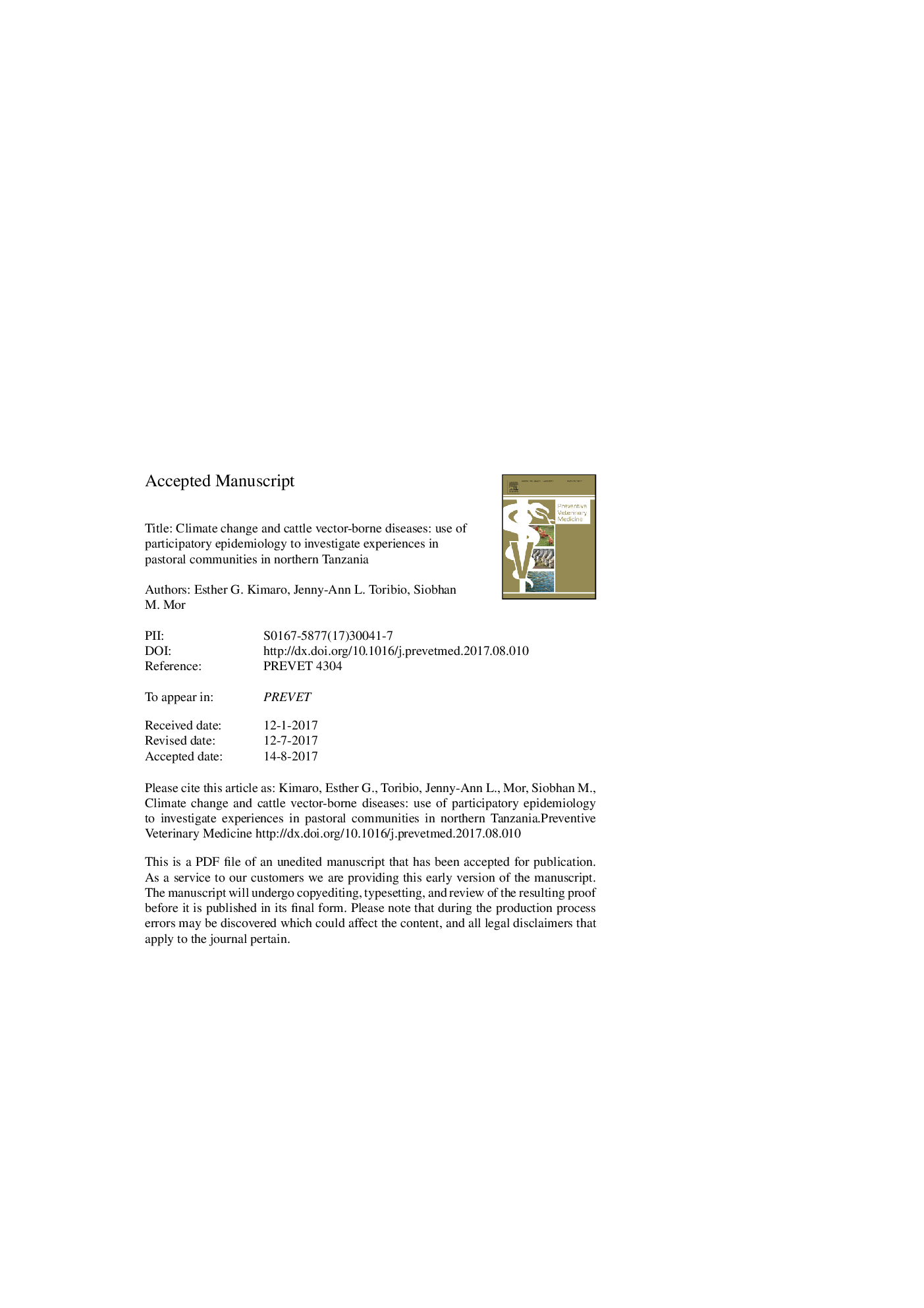| کد مقاله | کد نشریه | سال انتشار | مقاله انگلیسی | نسخه تمام متن |
|---|---|---|---|---|
| 5543590 | 1554143 | 2017 | 38 صفحه PDF | دانلود رایگان |
عنوان انگلیسی مقاله ISI
Climate change and cattle vector-borne diseases: Use of participatory epidemiology to investigate experiences in pastoral communities in Northern Tanzania
ترجمه فارسی عنوان
تغییرات آب و هوا و بیماری های برون گاوی: استفاده از اپیدمیولوژی مشارکتی برای بررسی تجربیات موجود در جوامع روستایی در شمال تانزانیا
دانلود مقاله + سفارش ترجمه
دانلود مقاله ISI انگلیسی
رایگان برای ایرانیان
کلمات کلیدی
تغییر آب و هوا، تب همراه ساحل، تریپانوسوماییز حیوانات آفریقایی، اپیدمیولوژی مشارکتی، باغبانان، شمال تانزانیا،
موضوعات مرتبط
علوم زیستی و بیوفناوری
علوم کشاورزی و بیولوژیک
علوم دامی و جانورشناسی
چکیده انگلیسی
Climate change is predicted to increase incidence of vector-borne diseases in humans, however, little is known about the impact of such diseases in livestock. In the absence of historical data with which to examine the inter-relation between climate and disease, participatory epidemiological (PE) methods were used with Maasai pastoralists of Monduli District, northern Tanzania to establish local observations on two major vector-borne diseases of cattle, namely East Coast fever (ECF) and African animal trypanosomiasis (AAT). Data collection involving gender segregated groups (10 men groups and 9 women groups) occurred in 10 randomly selected villages between November 2014 and March 2015. ECF and AAT were ranked amongst the top 5 most important cattle diseases with strong agreement across informant groups (Kendall's W = 0.40 for men and 0.45 for women; p < 0.01). Matrix scoring for both men and women groups confirmed that Masaai easily recognize these diseases. All groups associated ECF with the wet and cool dry seasons. AAT was more variable throughout the year, with more cases reported in the long dry season. Likewise, pastoralists reported differences in seasonal occurrence of disease vectors (Rhipicephalus appendiculatus and Glossina spp.) by village. Comparing 2014-1984, participant groups consistently reported declines in rainfall, vegetation cover and quality pasture, as well as increases in severe droughts. Experiences with ECF/AAT and vector abundance between these time periods was more variable across villages, and likely relates to changes in climate and animal management practices over the last 30 years. This baseline study is the first to document the inter-relation between climate and cattle vector-borne disease from the pastoralist perspective. Findings from this study reveal a complex interplay between human, animal and environmental factors, understanding of which is urgently required to devise approaches to mitigate effects of climate change in these vulnerable areas.
ناشر
Database: Elsevier - ScienceDirect (ساینس دایرکت)
Journal: Preventive Veterinary Medicine - Volume 147, 1 November 2017, Pages 79-89
Journal: Preventive Veterinary Medicine - Volume 147, 1 November 2017, Pages 79-89
نویسندگان
Esther G. Kimaro, Jenny-Ann L.M.L. Toribio, Siobhan M. Mor,
